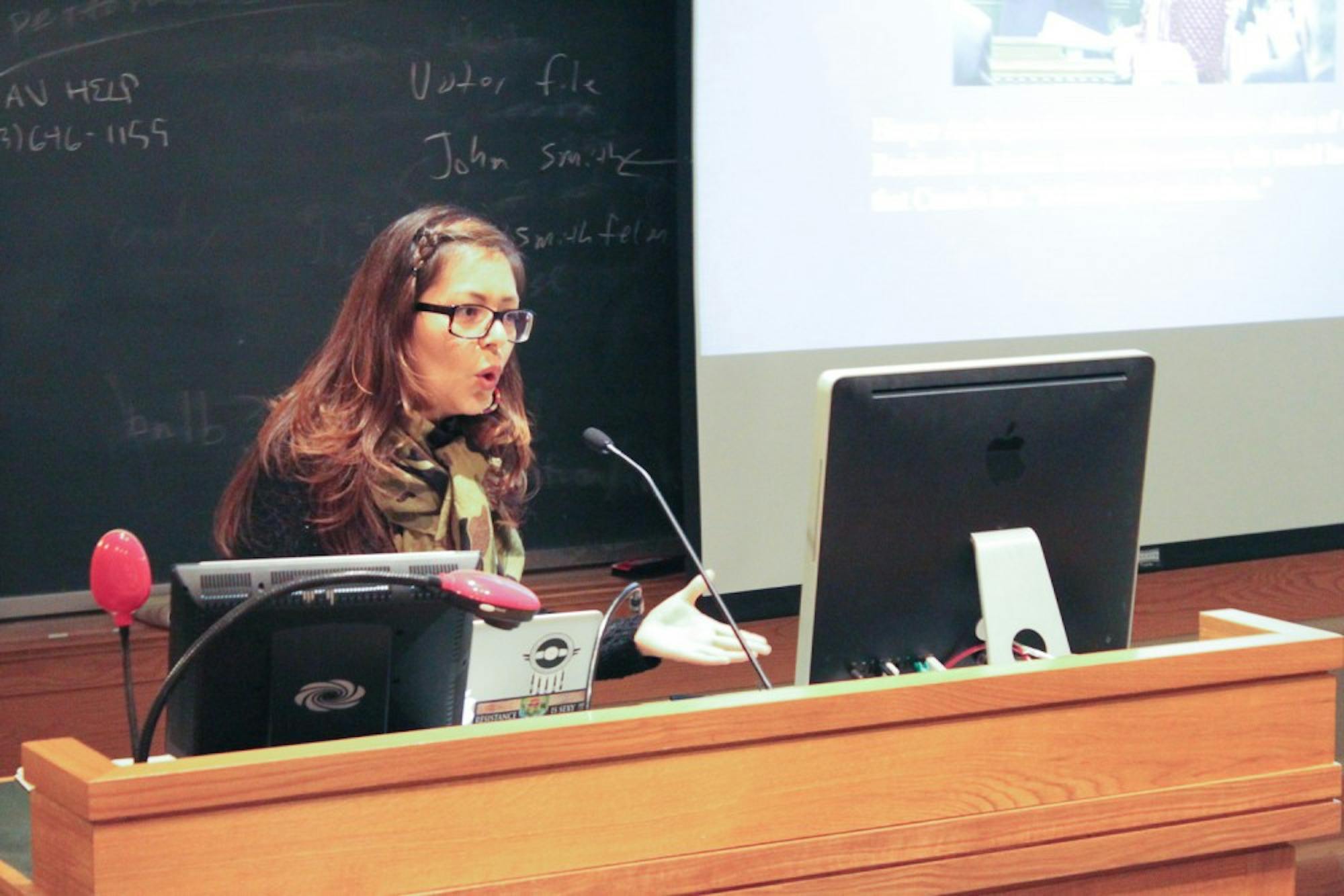When activist Tanya Kappo first began using the hashtag #IdleNoMore on Twitter to promote social justice for the indigenous peoples of Canada, she had no idea that she was starting a nationwide movement. The Idle No More movement has since inspired hundreds of protests, a hunger strike and highway blockades throughout North America. Kappo discussed the movement and the indigenous struggle in Canada in a lecture on Wednesday.
Kappo critiqued the Indian Act of 1876 and other legislation that established guidelines for the relationship between indigenous peoples and the Canadian government.
“That started out as how the government would respond to its responsibilities for Indians and Land Reserves for Indians,” Kappo said. “And it became, and it still is, a very oppressive piece of legislation, probably historically one of the most racist laws in the world that still exists today.”
As a result of the Indian Act, the Canadian federal government formed treaties with indigenous tribes, through which the First Nations people expected to receive help in adjusting to the new society in exchange for sharing land, she said.
Despite this initial plan, the government began to perceive its responsibilities to the indigenous population as a nuisance, Kappo said. In the early 1900s, the head of the Indian Affairs Department, Duncan Campbell Scott, went as far as to openly admit that the Indian existence was always a problem.
“What they are proposing to do is to get rid of what they started to term as ‘special rights’ for Indians,” Kappo said. “Then they went on to blame the Indians for how it is the Indians’ fault that they face the situation that they face.”
Following this shift, the indigenous population’s treaty rights, as well as the status of their reserve lands, has been under constant threat, Kappo said. When Stephen Harper became prime minister in 2006, the First Nations people were particularly anxious because Harper announced that there would be no special rights for the indigenous nations. In the past few years, the Harper government has been passing and proposing legislation intended to end the First Nation people’s treaty rights, make them surrender reserve lands and abolish the Indian Act.
About a year ago, Kappo learned that a few indigenous women in Saskatchewan decided to have teach-in sessions to inform the public about the actions of the Harper administration toward environmental issues and indigenous peoples. She decided to hold a teach-in session herself at an indigenous community, and quickly realized that social networks might have a large potential impact.
“There was this opportunity for the people to listen in on the Internet to my whole teach-in that day,” she said. “Because there were a lot of people on my social network who were really interested to find out what we’ll be talking about and what were the people going to say.”
Idle No More has inspired numerous protests and served as an impetus for other related movements, including the Flash Mob Round Dance and the Journey of Nishiyuu.
“One of the most active ones outside the Canada is actually New Zealand in their own context,” she said. “This was one of the other pivotal points of Idle No More as for people to do what they need to do, how they need to do it in their own space and in their own circumstances.”
Kappo ended the lecture with her goals for the movement in Canada.
“If Stephen Harper phoned us tomorrow and said we are going to give you everything you want, my opinion is we are not ready,” she said. “We need to have the conversation first ourselves to say what we want, then move forward. By that time, it won’t matter what Harper says or whoever the Prime Minister says. Because by that time, this is who we are no matter what anyone says.”
Graduate student Rose O’Leary, who was familiar with Idle No More, said Kappo’s presentation was very informative.
Kayla Atcitty ’17 said she had seen the round dance movement in her town and appreciated that Kappo included it in her talk.
“I thought it was interesting that how it’s mainly Native women leading those movements,” she said.
Kappo’s lecture, titled “Indigenous Activism and Idle No More,” was sponsored by the Native American studies program.




